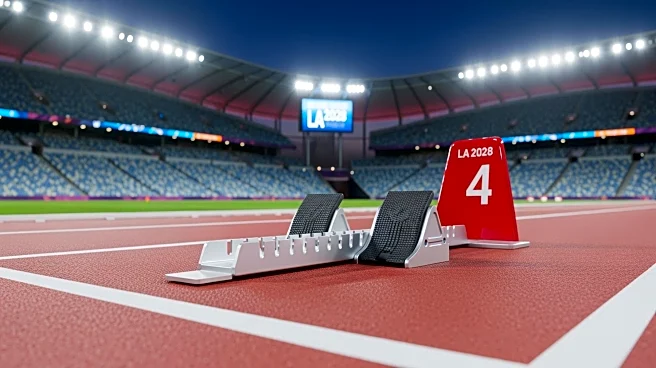What's Happening?
The 2028 Los Angeles Summer Olympics will feature a historic change in its opening schedule, with the women's 100-meter track final set to open the first night of medal competition. Traditionally, the men's 100-meter final precedes
the women's, but this shift aims to highlight gender equality in sports. Olympic gold medalist and World Athletics president Sebastian Coe emphasized the importance of demonstrating equality on such a significant platform. The decision was made after consulting athletes and coaches, ensuring that the change aligns with the athletes' capabilities and training schedules. The LA28 Olympics will also feature a record number of female athletes, with 50.5% of the total athlete quota allocated to women.
Why It's Important?
This change in the Olympic schedule represents a significant step towards gender equality in sports, providing female athletes with a prominent platform to showcase their talents. By opening the Games with the women's 100-meter final, the organizers are sending a powerful message about the importance of equal representation and opportunity in athletics. This decision could inspire future generations of female athletes and contribute to the ongoing efforts to achieve gender parity in sports. The increased visibility of women's events may also attract more media attention and sponsorship opportunities, further supporting the growth of women's athletics.
What's Next?
As the LA28 Olympics approach, athletes and coaches will prepare for the new schedule, adjusting training regimens to accommodate the demands of competing in multiple rounds of the 100-meter dash in one day. The organizers will continue to engage with athletes and stakeholders to ensure the successful implementation of the schedule changes. Ticket registration for the Games will begin in January 2026, allowing fans to secure their spots for this historic event.
Beyond the Headlines
The decision to prioritize the women's 100-meter final at the LA28 Olympics reflects broader societal shifts towards gender equality and empowerment. It highlights the role of sports as a platform for social change and the importance of challenging traditional norms. This move may encourage other sports organizations to reevaluate their practices and prioritize gender equality in their events and policies.









